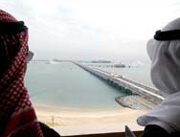|
 |
| Rapid economic growth in Asia is driving oil
demand |
Opec oil ministers have agreed to lift production ceilings by an extra
500,000 barrels of oil a day to help cool prices from recent record
levels.
Opec also held out the prospect of a further boost
to output , saying it
would consider another rise of the same magnitude between April and June.
Prices fell on the news but later rose to new highs of above $56 a
barrel on a surprise dip in US petrol stock levels.
Opec's move is unusual; spring weather in big economies usually brings
cuts.
But Opec member states are already pumping above the new daily output
ceiling of 27.5 million barrels, so the move may have only a limited
impact.
"They are raising the ceiling because it's already produced," the
Agence France Presse news agency quoted Libya's energy secretary Fathi
Hamed ben Shatwan as saying.
"We're all already over quota," said Algerian oil minister Chakib
Khelil.
US light sweet crude dipped 25 cents to $54.80 on the Opec
announcement, while in London Brent crude fell 30 cents to $53.55.
In afternoon trade, however, prices edged up as US government data
showed petrol and heating stocks had fallen.
Opec said it would keep a close eye on oil prices over the coming
weeks, pledging to take "appropriate and prompt action" where necessary,
ahead of an extraordinary meeting in Vienna on June 7.
Saudi Arabia had been pressing for an immediate increase in supply but
other Opec members were thought to be less keen - Algeria and Libya
directly opposed the move.
Iran, Kuwait and Nigeria had suggested that any increase be put off
until May to allow the seasonal dip in the second quarter of the year to
feed through.
Oil analysts and traders were doubtful about the impact of the new
output levels as Opec members are already thought to be producing about
two million barrels a day more than official production limits.
"It will not drive the price down but stabilise it and keep it from
zooming into the stratosphere," said Professor Anthony Sabino of St. Johns
University's business school in New York.
Saudi oil minister Ali al-Naimi told the al-Hayat newspaper that oil
prices should be between $40 and $50 a barrel.
"Supply and demand are balanced now on the oil market and stockpiles
are good," he said.
"But when we looked at demand in the last quarter we found that there
will be a big jump between the third and last quarter by around 2.7
million barrels a day."
(Agencies) | 